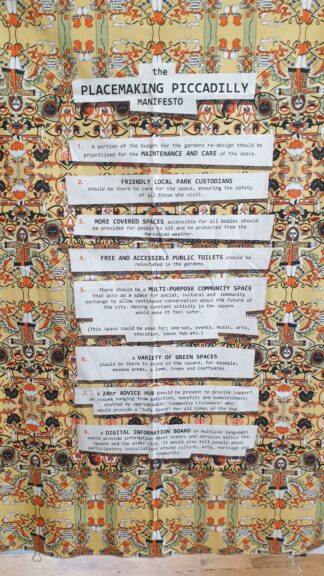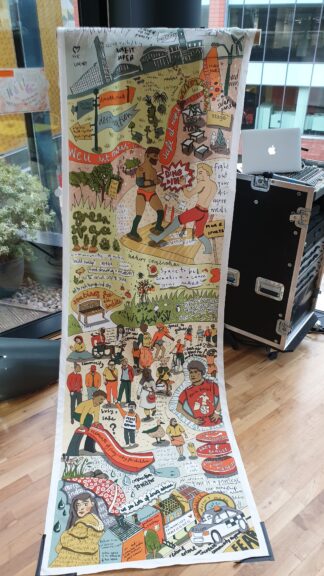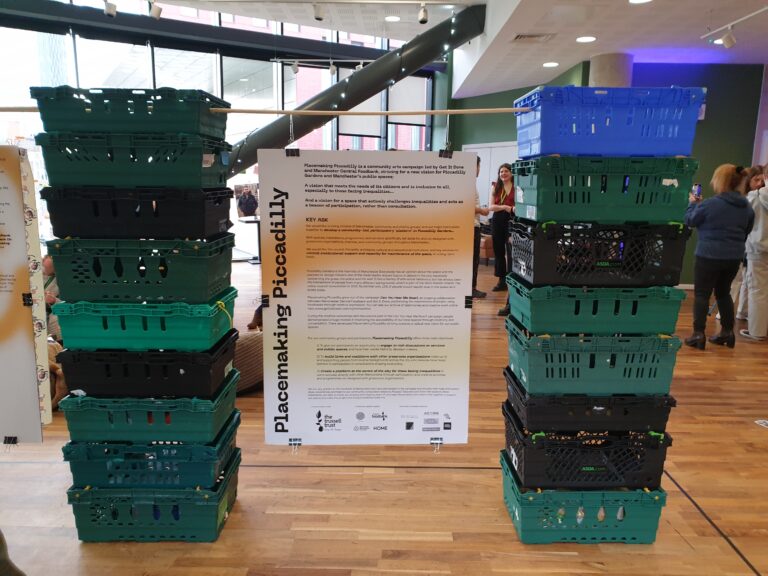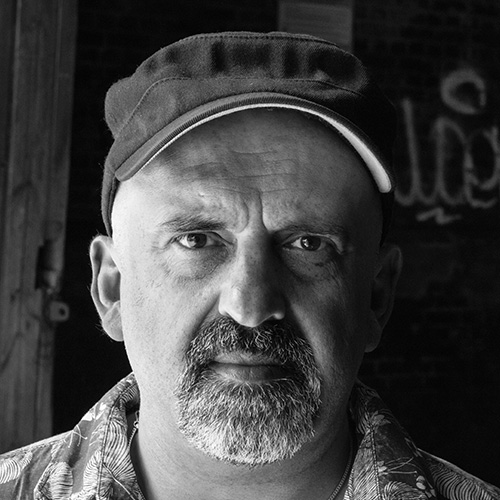A tale of two diverging cities is unfolding in Manchester. The gleaming spires being erected across the city, many bearing luxury flats marketed to overseas investors, is the economic development success story that is uppermost in most minds due to its monumental visibility.
The other story is less visible. It concerns a city where ever greater numbers of people are dependent on food banks, exacerbated by the cost-of-living crisis. A city where increasing numbers of homeless people are placed in unhealthy and insecure temporary accommodation, their lives on hold until a secure and safe home can allow them to plan for the future. A city where vulnerable communities are being routinely failed by public services cut to the bone by austerity.
The Placemaking Piccadilly campaign event at HOME brought to the fore the less visible story of people struggling in Manchester, with the aim of giving them a voice to encourage a more inclusive future development agenda in Manchester. The exhibition on the 28th of April presented the work of a campaign that has focused on the redevelopment of Piccadilly Gardens announced by the council in January 2021, that has asked vulnerable communities using the gardens, who often don’t feel comfortable engaging with the official council consultation process, what they wished to see them become.

Matthew Stallard is a co-organiser of the campaign and the chair of trustees at Manchester Central Foodbank. His work has given him first hand knowledge of the increasing number of people experiencing poverty and reliant on food banks in the city. Speaking to Matt at HOME, he explained that the project began early last summer during creative sessions they held with foodbank users, one of which focussed on public space inequalities, a theme which really resonated with the group and led them to focus on the announced redesign of Piccadilly Gardens.
This central public space in Manchester has been described as the city’s “heart and soul”, but generally finds itself in the news for all the wrong reasons: crime, violence, drug use, litter, begging, rough sleeping.
Matt described the campaign to guide the redesign of the gardens as a chance to “make our city and our flagship public square a nationally-leading beacon of trailblazing civic pride which places the voices of those most marginalised at the centre of our public conversation. We have the chance to reimagine the communities, city, and society in which we want to live in.”

One of the events held by the campaign over the last year was the People’s Takeover of Piccadilly Gardens in October, which exhibited a community tapestry focussing on the gardens’ redevelopment. This gave people the chance to share their ideas of how the gardens should be developed, and what the campaign should be asking for when it comes to changing how development is done. It was input from this event, and others, that provided the gist of the Manifesto for Change produced by the campaign. Matt said:
“We did a whole range of consultation participation sessions with different community groups and then asked similar kinds of questions in our big public events, and that manifesto really is a boiling down of all the information, thoughts and reflections that we gathered from people. We then ran two co-design sessions with volunteer and activist members who helped to boil it down into the eight key themes and write it into a clear manifesto.”
The eight-point manifesto was displayed at HOME on a vertical banner, with paisley inspired campaign artwork in the background.


The manifesto, and other information gathered by the campaign had been previously distributed via the campaign’s networks, and numerous councillors and civil servants from Manchester council were invited to the event, with Matt reporting a couple had already attended and that he was hoping to see a few more interact with the campaigns output before it finished.
‘Participation not consultation’
The event space on the second floor of home is a bright and airy one with windows looking out over Tony Wilson place, containing the statue of Friedrich Engels staring sternly towards the glittering Deansgate Towers clearly visible above the rest of low-rise Manchester. I was met by friendly helpers who supplied me with information sheets, postcards and blank Piccadilly Garden design sheets for me to jot down or draw my suggestions of how the garden should be developed.
In the centre of the room people were sitting and chatting on beanbags or watching a video showing highlights from the campaign. A circuit had been created around the room from stacks of green food crates and in between these stacks were hung a series of posters which told the story of the Placemaking Piccadilly campaign. The large floor to ceiling windows were peppered with photographs of previous events, artwork and garden design sheets submitted by participants.


Co-creators of the campaign were the arts organisation Get It Done. Mimi Dearing is the creative project lead at Get It Done, and at the event at HOME she spoke of the need for “participation not consultation” when it comes to deciding on development projects in Manchester, and said:
“The current system that the council has can be quite limited, as in only a certain groups of people will typically respond to this. People who have the time to fill out an online consultation, the technology and also mainly the confidence that their voice will be heard and listened to. We found a lot of people that we’ve been working with through the food bank in particular, they kind of don’t have that same confidence.
“So we’ve been pushing for a kind of longer, deeper, active participation in the decision making processes, over some kind of remote online consultation, or even in person consultation. I think there needs to be an active shift into direct engagement with people and kind of going that extra step to bring these decisions to them.”

The Manifesto for Change point asking for a creative community space in Piccadilly Gardens is Mimi’s favourite and she describes the People’s Takeover of Piccadilly Gardens event as:
“An amazing day of lots of different creative activities, collaborations, all kinds of different things and I feel in my eyes, that was kind of the turning point of the campaign, that’s when it kind of stopped being like lots of workshops and conversations and started being a campaign and like actually making some change.”
The official council public consultation process for the redesign of Piccadilly Gardens was launched on 25 January 2021 and finished on 23 March the same year. There is next to no information available on what was collected in the consultation on the council’s website. In the initial stages of considering the redevelopment the council were working with Manchester-based architects LDA Design, who submitted three designs before the consultation process began.
After the consultation ended the council in August 2021 tendered a Piccadilly Design Competition, worth £660,000, to appoint a landscape architect design team to create plans for the new gardens, with an estimated start date for redevelopment on the 1 June 2023. In March this year the council announced six design teams, including LDA design, shortlisted to develop detailed designs for the gardens. The estimated total cost for the redevelopment project is £25m, and the official consultation and development process is moving forward in its usual manner.
“Consultation doesn’t seem to me to really do the job it’s meant to do”, Matt says and carries on to explain how a more participatory process with “constant feedback and conversation, would have provided a far more, far richer, deeper and truer kind of output in terms of finding out what people really want and think.”

The failings of the current consultation and development mechanism are not down to any “malevolence” on the part of the council, Matt explains, but simply down to institutions and hierarchies work, and that he would like to see the process turned into a “community led forum where grassroots groups kind of can set the agenda and say this is the issue we want to talk about and then ask the council, the libraries and museums, the universities to kind of partner and support and platform those voices.
“Then the council, for example, could make better decisions. We can probably do that kind of participatory conversation work and gathering of evidence in a way that they can’t.
“Can that make their consultations and their decision making for solid policymaking better? The type of data that, say, a group of food bank users in Ardwick would gather on their area about where it’s expensive to get food, how far you have to walk to get to the nearest bus stop, or local services.
“That’s not the data the council uses to make decisions about services, so you know if we can get partnerships that invest in that kind of participatory grassroots evidence and data gathering. Maybe they can actually benefit from it.”
For Manchester Central Foodbank’s website – click here
For Get It Done’s website – click here
Sign up to The Meteor mailing list – click here
This story is part of the Creating Radical Change series
Featured image: composite of Conrad Bower photo (foodcrates) and Wikipedia Commons image.



Leave a Reply